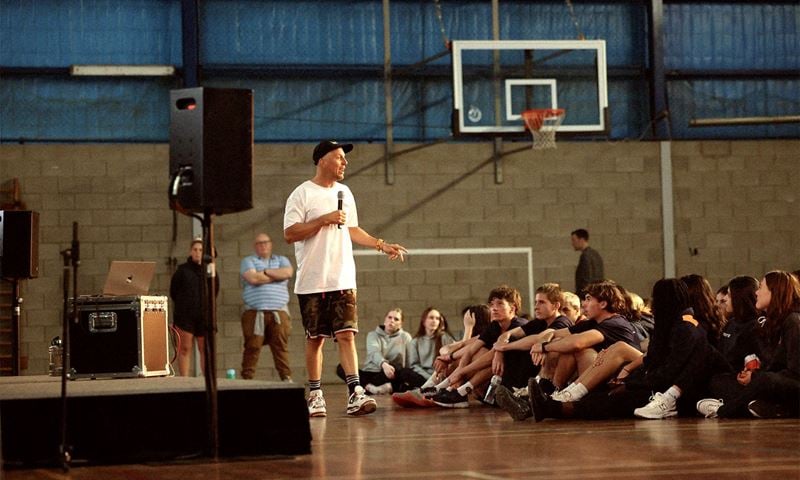Published 12 Feb 2025
It is estimated that almost half of Australians will experience poor mental health at some point in their lives, and the findings are even more concerning for our young people. The Resilience Project, powered by GMHBA with support from the Geelong Football Club, is one organisation taking a proactive approach to address youth mental health and wellbeing. We spoke with The Resilience Project facilitator Martin Heppell about the important work they’re doing in Australian schools, as well as wellbeing strategies that can benefit us all.

Listen to the 30 minute podcast here.
What is The Resilience Project?
GMHBA are proud to partner with The Resilience Project, an organisation delivering emotionally engaging programs to schools, sports clubs and businesses Australia-wide and providing practical, evidence-based mental health strategies to build resilience and happiness.
As part of its community engagement program, GMHBA has teamed up with the Geelong Football Club to support the delivery of The Resilience Project in five Geelong schools. The partnership aims to inspire and engage the Geelong community by teaching the children positive mental health strategies and emotional literacy.
About the program
Created over ten years ago and rolled out to more than 1,000 Australian schools, The Resilience Project is an evidence-based program that positively impacts mental health.
The Resilience Project visits schools and works with teachers to deliver the program and help support their students in the classroom. The curriculum covers all years of schooling from primary level all the way up to year 12 and includes professional development for teachers and resources for parents.
The Resilience Project introduces the GEM principles and the importance of practising gratitude, empathy and mindfulness. Emotional literacy is a key component of the curriculum at all year levels.
Evaluated with studies from The University of Melbourne, the program has been demonstrated to help build:
- confidence and self esteem
- knowledge and ability to express emotions
- relationships at school and home
- more supportive classroom environments
What does the research tell us about the mental health of adults and children in Australia currently? Has this changed over time, and if so, what do you think is driving this?
The data has certainly changed over time but that doesn’t mean kids of today are less resilient (even if they don’t walk uphill both ways to and from school in 10 feet of snow).
The Australian data from over 1,100 students grade three and up shows us that:
- 29% of kids in primary school and 44% of kids in secondary school experience anxiety symptoms at certain times throughout the year.
- 1 in 4 primary school kids are experiencing symptoms of depression and this increases to 2 in 5 in secondary school.
- Kids in primary school are on their phones now more than ever with 1 in 5 in primary school and 2 in 5 in secondary school kids on their phones between 10pm and 6am.
- 1 in 4 primary school kids are not getting 8 hours of sleep each night, and this goes up to 50% in secondary school.
Nation-wide, 1 in 7 primary school kids will have a mental health illness and this increases to 2 in 5 in secondary school-aged kids. For Australian adults this is around 1 in 5.
Is it increasing? The previous generation didn’t have social media when they were growing up. So, today’s kids are being exposed to things that perhaps the previous generations weren’t.
Listen to the podcast
Martin explains more about supporting our kids in being independent decision makers, the GEM model of Gratitude, Empathy and Mindfulness for encouraging positive emotions and more in our Healthier Together podcast.
Want even more?
Visit Healthier Together podcasts to learn about and listen to other podcasts in this series.
You can find out more about The Resilience Project and enquire about their programs at www.theresilienceproject.com.au. You can also listen to The Imperfects podcast on Spotify, Apple Music and iHeart Radio.



